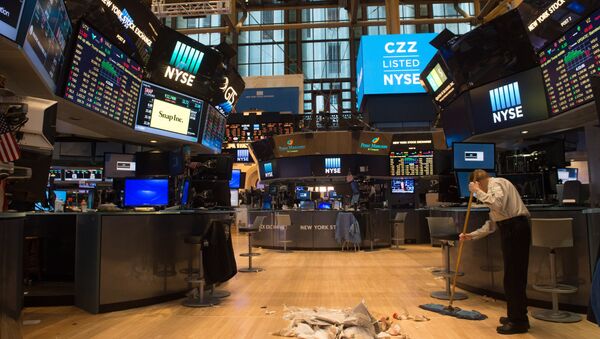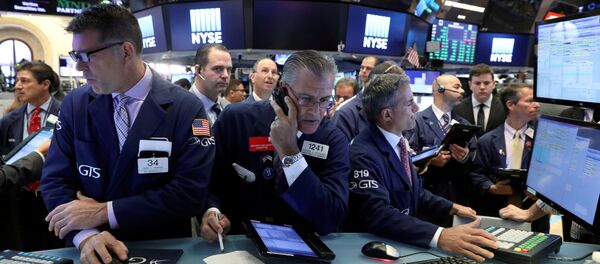Many market analysts dismiss fears of a new stock exchange bubble, however, saying that it won’t be long before the market starts going up again.
We Are Done For!
On Monday, the Dow Jones Industrial Average sank below the 25,000 mark shedding more than 1,500 points in daily trading and closing 1,175 points down – the largest intraday negative swing in the Dow's history.
In a matter of minutes, the US leading stock market index lost 1,600 points falling to a low 24,148 before recovering half of the lost value only to continue its plunge shortly afterwards.
“What we saw today was a plunge of the US stock market. It was preceded by bad news about high-risk bonds. Today’s crash is a technical correction by the market where a mass of trading algorithms came into play today,” Principal Investors’ portfolio manager Kyle Shostak told RIA.
Correction With a Jerk
Kyle Shostak agreed with CSIS Institute’s senior expert in that the situation has more to do with a market correction, rather than a “burst bubble.”
“The stock market was overheated in January going virtually through the roof in a single month. The market usually makes big gains at the start of the year but the way it was going up is too much,” he said, adding that a correction was inevitable.
Shostak believes that, just like in 2011, the Dow will stabilize and the market will rebound.
According to Smith's Research & Gradings director Terence Smith, falling investor confidence has also factored in Monday’s crash.
He said that amid expectations of a further tightening of the Federal Reserve’s monetary policy on the one hand, and high-risk instruments like Bitcoin also going down fast, investors are looking for new instruments to invest in.
Losing End
Kyle Shostak said that many rich people who invested their money in securities have lost part of their fortunes as company capitalization is down. Corporate pensions programs, which invest in multiple instruments, including securities, have also suffered as they will have to make up for their losses by attracting more funds, he explained.
“Private investors, institutionalized investors and foundations that played against the market, staking on shorts on expectations of a further plunge on Monday eventually ended up as winners. They are the few and far between though, that’s why I don’t see this as a trend,” Shostak concluded.
The world’s 500 richest people have lost a combined $114 billion as Monday’s record stock market crash has eaten into their wealth, Bloomberg wrote.
Berkshire Hathaway chairman Warren Buffett, the world’s third-richest person, was hardest hit, losing $5.1 billion. Berkshire Hathaway is a major holder of Wells Fargo & Co., which has seen its net worth fall a hefty 9 percent.
READ MORE: US Stocks Plunge as Interest Rate Fears Grip Markets
In the second biggest loss, Facebook CEO Mark Zuckerberg’s fortune has shrunk by $3.6 billion.
The world richest person, Amazon founder Jeff Bezos, has not been spared either seeing his fortune lose $3.3 billion to go to $116.4 billion after the retailer’s stock fell 2.8 percent.
Alphabet’s Larry Page and Sergey Brin have lost $2.3 billion each.



